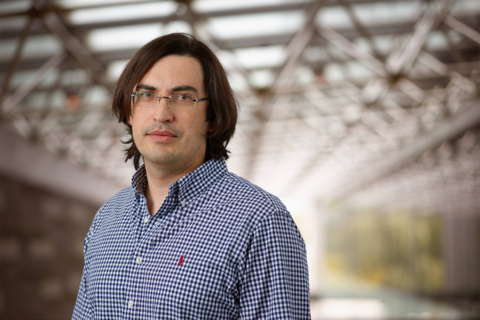
-
Email: dmitry.pushin@uwaterloo.ca
-
Office: RA2 1106
-
Office Phone: 519-888-4567 ext. 31193
-
Admin Support: Sarah Wang
Dmitry Pushin has formal training in experimental neutron physics and interferometry, quantum information, and condensed matter physics. He uses his broad background to apply quantum information processing methods to improve neutron interferometry, with the goal of making it accessible to the general scientific community as a resource for studying fundamental questions of physics, dark energy, phase transitions in condensed matter, magnetic materials in functional devices and materials science.
Pushin received his Bachelor of Science from the Moscow Institute of Physics and Technology (MIPT) and Master’s of Science in Physics from the MIPT and the Institute of Solid State Physics, Chernogolovka with honours. He completed the PhD program in the Department of Physics at the Massachusetts Institute of Technology (MIT) concentrating in the areas of quantum information, neutron physics and coherent control of neutron interferometry. After graduation he was appointed Postdoctoral Research Associate at the MIT Department of Nuclear Science and Engineering and the National Institute for Science and Technology Centre for Neutron Research (NCNR). There his application of quantum error-correction concepts to neutron interferometry led to the design and commissioning of a novel device, the decoherence-free subspace neutron interferometer, proven to be much less susceptible to environmental noise than conventional devices and thus suitable for the high-throughput investigations of materials science.
Pushin is the principal investigator of a new neutron interferometry beam line under construction at NCNR, which will be the world’s first dedicated neutron interferometry user facility. He holds the position of Associate Professor at the Institute for Quantum Computing (IQC) and Department of Physics and Astronomy at the University of Waterloo.
Research pursued in his group links quantum information, neutron physics, and condensed matter physics. Diverse new directions have spawned off of these efforts and include, for example, neutron phase imaging, searches for dark energy and tests of Born’s rule of linearly of quantum mechanics.
Degrees
- PhD, Physics, Massachusetts Institute of Technology, 2006
- MS, Physics, Moscow Institute of Physics and Technology, 1997
- BS, Physics, Moscow Institute of Physics and Technology, 1995
Major Positions
| Title | Location | When |
|---|---|---|
| Associate Professor | Institute for Quantum Computing and Department of Physics and Astronomy, University of Waterloo | May 2017-Present |
| Research Assistant Professor | Institute for Quantum Computing and National Institute of Standards and Technology (NIST) | September 2010-May 2017 |
| Postdoctoral Associate | Massachusetts Institute of Technology and National Institute of Standards and Technology (NIST) | November 2006-September 2010 |
| Research Assistant | Swiss Federal Institute of Physics and Technology | September 1997-September 1998 |